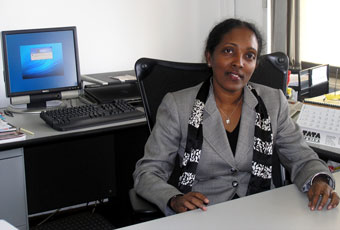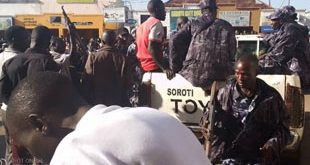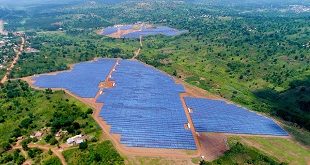
By Patrick Kagenda
On the Aug 12 Robert Zoellick the President of the World Bank visited three great lakes countries, DRC, Rwanda and Uganda. The Independent’s Patrick Kagenda talked to Kundhavi Kadiresan, the World Bank Country Manager for Uganda, about the visit and the World Bank projects in the country.
What is the scope of projects and programs financed by The World Bank in Uganda?
They are both financial and non-financial. Most people know us for the financial support we provide to developing countries, yet we are really a knowledge bank providing analytical and advisory services, economic and sector analyses, and sharing of best practices on developmental issues. These analytical services are sometimes much more important than the actual dollars given to governments in development assistance.
The extensive policy dialogue we engage in with the government may not be as visible as our financial support, yet it is possibly one of our core contributions to development.
How much money has the World Bank invested in Uganda so far?
The World Bank’s relationship with the government of Uganda dates back to 1961 with a project to extend electric power transmission and distribution. Uganda, however, formally joined the Bank in 1963. Since then, the Bank has provided more than US$5.3 billion in loans and credits and over US$600 million in grants for various development programs across all sectors including transport, health, education, energy, private sector development, local government, rural development, and public sector reform, including direct budget support. As of August 2009, the Bank was supporting 20 operations with financial commitments of approximately US$1.5 billion, including US$200 million for direct budget support under the Seventh Poverty Reduction Support Credit (PRSC7).
Uganda has signed some agreements with the World Bank for development assistance in the areas of education, energy and support to Northern Uganda. At the same time you announced that some projects worth about US$390 million were in the offing. Can you please throw more light on this?
On August 27 the government of Uganda represented by minister of Finance Syda Bbumba, and the World Bank represented by myself, signed agreements worth US$325 million to support the Universal Post Primary Education and Training Program (UPPET), the Second Energy for Rural Transformation project (ERT II) and the Second Northern Uganda Social Action Fund (NUSAF II). The NUSAF II will help consolidate the development already gaining momentum in Northern Uganda, a region which has great potential to contribute to Uganda’s future growth. In the energy sector, ERT II will address the improvement of electricity and communications access, particularly in rural areas.
The pipeline projects which we hope to deliver over the next 12 or so months include: A US$100 million health project aimed at improving delivery of the Uganda National Minimum Health Care Package; a $190 million Transport Sector Development Project to support the upgrading of the major road corridors to Sudan and the detailed design for the first phase of a bus rapid transport (BRT) for Kampala, among others, and a US$100 million Poverty Reduction Support Credit for direct budget support. We are also in the early stages of working with Government on another US$100 million project to support agricultural research and advisory services, which would bring the total pipeline to almost US$500 million.
The World Bank President, Robert B. Zoellick recently visited Uganda. Would you say this visit achieved for both the Bank and for Uganda?
President Museveni and President Zoellick underlined five key issues that Uganda should focus on in the coming years: Energy (in the broader context of the East African Power Pool); Roads and Railways development (especially developing reliable transport corridors to the sea and trade facilitation corridors within the East African community); Commercialising agriculture with a view to value addition and economic transformation; vocational skills development to make people more relevant for the job market; and finally options for greater private sector financing, including the adoption of strategic public private partnerships.
What is the World Bank’s view of China’s growing economic influence in Africa versus the Bank’s support to the region?
The World Bank welcomes all development partners that are supporting countries in Sub-Sahara African to get out of poverty. China increasing its economic influence in Africa is good news, because it will allow not only for increased funding to the region, but also flow of technology and knowledge that can be useful in developing countries. Just as an example, in FY08 the World Bank Group committed US$7.3 billion to support development programs in sub-Sahara Africa; however, sub-Sahara Africa requires US$22 billion each year for infrastructure development and an additional $18 billion for its maintenance. The World Bank and other development partners cannot provide all this financing and so nations like China are coming in to compliment our efforts.
Uganda is on the verge of becoming a major oil producer yet it has kept its PSA’s secret, what is the World Bank’s view of the issue?
The government of Uganda has made good progress in implementing the National Oil and Gas Policy. However, much work remains to establish a regulatory and institutional framework including for policy implementation, public revenue management, and environmental management that ensures that petroleum revenue is transformed into better incomes and prosperity for all Ugandans.
The World Bank is prepared to provide support to the Government in achieving the objectives above, drawing on international best practice to effectively implement the National Oil and Gas Policy.
Uganda’s oil reserves are reportedly considerably higher than earlier expected. If this is correct, it is possible that oil volumes would justify the construction of an oil pipeline or oil refineries.
The Government of Norway has been one of the key advisors to the Government of Uganda with regard to the development of its oil resources. A feasibility study funded by the Norwegian government is underway to look at various options in developing and distributing oil. To answer this question appropriately, we will have to wait for this exercise to be completed.
 The Independent Uganda: You get the Truth we Pay the Price
The Independent Uganda: You get the Truth we Pay the Price


